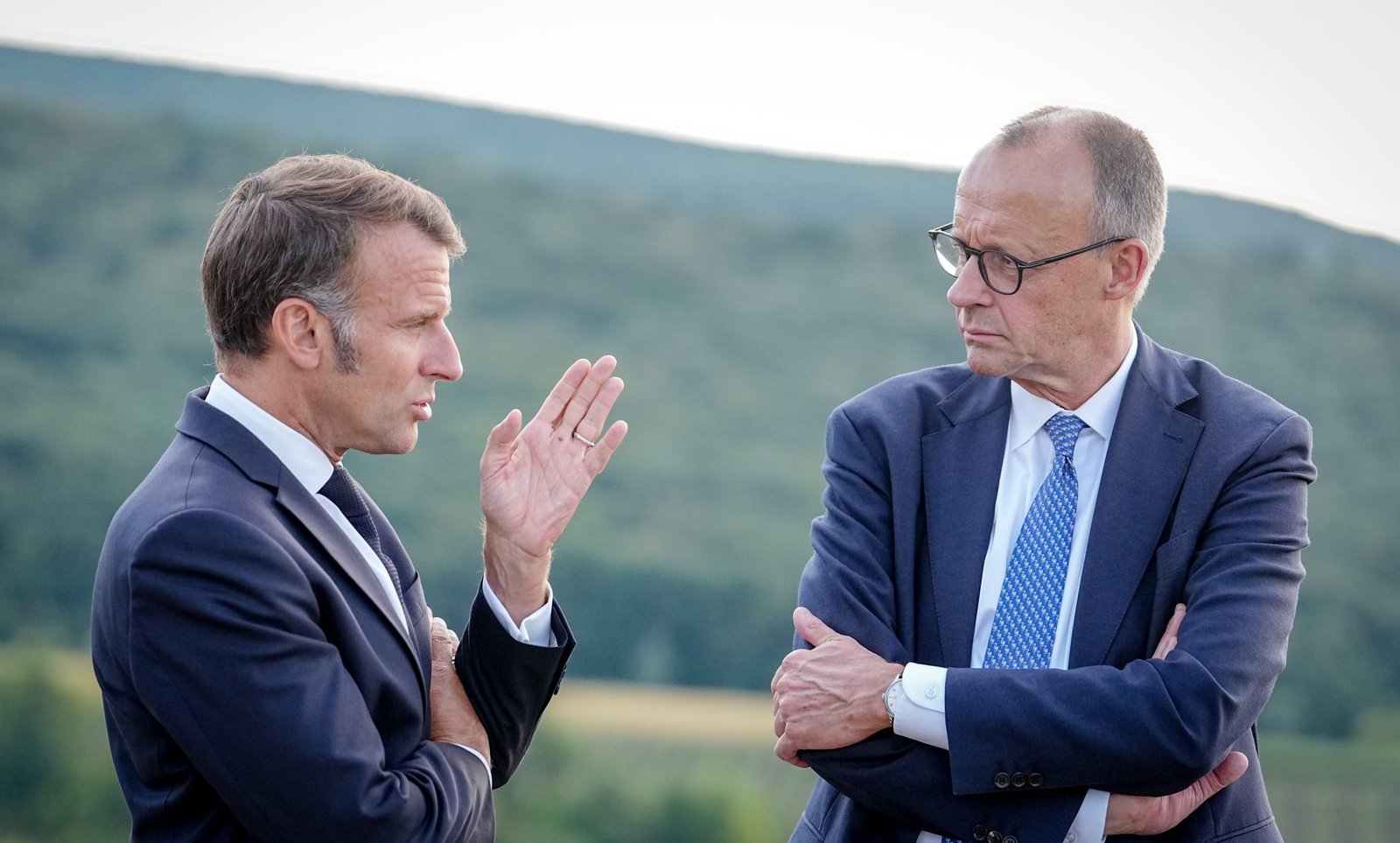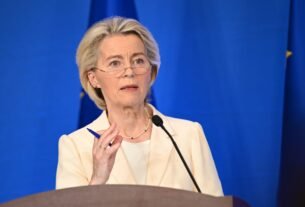On a sun-drenched August day on the Côte d’Azur, French president Emmanuel Macron tried to calm German nerves following a joint cabinet meeting, insisting that yet another domestic political crisis in Paris wouldn’t derail the two countries’ rekindled friendship.
Following the meeting with Chancellor Friedrich Merz’s top team, Macron was grilled by journalists who wanted to know whether any of the joint initiatives covering everything from energy to trade that were agreed at the summit in southern France would survive, given that obituaries were already being written for then-Prime Minister François Bayrou’s government.
Macron replied that domestic political turbulence has ”never been an obstacle“ when talking about the crucial cooperation between the European Union’s two largest economies, that combined also account for a third of the bloc‘s population.
In reality, domestic troubles have proven a persistent obstacle to building momentum in the EU’s crucial partnership over recent years.
The Franco-German partnership, once hailed as the EU’s engine that would always drive integration in the single market and other major European projects, has stalled as Paris and Berlin have in turn been distracted by their own political crises.
Monday’s no-confidence vote that ousted Bayrou – Macron’s fourth prime minister in three years – is only the latest drag on the momentum, raising further questions about the future of the alliance at the core of Europe.
Chancellor Friedrich Merz’s government back in Berlin has tried putting on a brave face. Chief spokesperson Stefan Kornelius said ahead of the vote that Berlin had “no concerns” about France, while senior coalition MPs downplayed fears of a split.
But in private, unease is growing. One German parliamentary source close to the coalition admitted there was “great concern over France’s deadlock and fiscal woes affecting Franco-German cooperation, which was also shared with the government”.
The same source added that some voices in the coalition have wondered whether Germany should chart its own course, as France appears to be an unreliable partner.
Some German parliamentary sources say this is most acutely felt in areas with existing tensions, such as as major joint defence projects, and warned of an erosion in Franco-German cooperation.
On and off
Just a couple of years ago, however, it was German political paralysis that was annoying the French.
Under ex-Chancellor Olaf Scholz, who left office in early May, an unwieldy three-party coalition found itself repeatedly deadlocked – particularly on climate and budget policy.
Then Macron gambled away his parliamentary majority by calling snap elections last summer, just after the French far right scored a victory in EU elections. That was soon followed in turn by the breakdown of Scholz’s coalition.
According to Yann Wernert, an expert on Franco-German relations at the Jacques Delors Centre, those alternating bouts of instability reflect a broader shift in Europe. US security guarantees have become less reliable as war returned to the continent, putting pressure on already strained budgets and governments, he said.
Ironically, Bayrou’s fall comes just as relations warmed under Germany’s new Francophile chancellor, Merz, who staged a choreographed show of unity with Macron in France less than two weeks ago. The pair even announced a substantial agenda for the economy and security.
Those initiatives are now “on stand-by”, said Jacob Ross, a political scientist at the German Council on Foreign Relations (DGAP).
Replacing Bayrou with Macron loyalist Sébastien Lecornu, just recently France’s defence minister, is targeted at limiting disruption, but it’s unclear whether a new French cabinet would stick to deals struck by others, Ross said.
Forever alone?
There is also a deeper, structural issue.
Bayrou’s downfall buried plans for spending cuts and once again exposed France’s inability to implement serious budget reforms. That leaves the country, which has the third-highest debt-to-GDP ratio in the EU, with little room to manoeuvre.
For years, France has been unable to pull its weight in European fiscal matters, while Germany shouldered more of the burden. That means joint projects have been confined to low-cost measures or depend on Berlin’s financial firepower.
“There is an imbalance in the fiscal investment that France and Germany can contribute,” said Wernert, noting though that, unlike Germany, France already has a reasonably well-equipped military.
But the immense challenges facing Europe require major investment. In his seminal report on the future of the European economy, Mario Draghi, the former chief of the European Central Bank, estimated that EU countries need to spend an additional €800 billion per year, or more than 4% of EU GDP, to meet needs around rearmament, climate neutrality and economic competitiveness.
France, though, is barely capable of contributing. Paris now spends more on servicing debt – €67 billion per year – than on defence. The imbalance is also starkly illustrated by military aid to Ukraine, where Germany’s contributions dwarf those of France.
Caught in a bad bromance
But few in Berlin see a viable alternative to a strong and reinvigorated Franco-German partnership when it comes to advancing a European agenda of rearmament and competitiveness. The United Kingdom has left the bloc and remains politically unstable; Poland and Spain face their own domestic upheavals; and Italy is trapped in the same fiscal straitjacket as France.
That leaves many in Berlin praying for a stable French government with presidential elections set for 2027, and the far-right National Rally (RN) looking to capitalise on the chaos.
Armin Laschet, a Christian Democrat who chairs the German parliament’s foreign affairs committee, said he hopes the incoming French prime minister can advance reforms “consensually and with greater sensitivity”.
Markus Töns, the lead Social Democrat on EU affairs in Germany’s parliament, said that some of the fiscal worries regarding France’s “difficult phase” are overblown: “The debt figures are far from being a serious cause for concern, especially in comparison with some other EU countries.”
Lasting dysfunction in the relationship, however, could have profound implications for the EU’s future.
“If the concept of the Franco-German engine is beyond repair and outdated, then in my view this means that European integration as we know it has reached a dead end,” DGAP’s Ross warned.
An unsustainable, perpetual crisis will ultimately force EU members to decide whether to take the leap toward a functional federal state, Ross added – but “without joint Franco-German compromises and initiatives, there can be no further deepening of the EU”.
Laurent Geslin contributed reporting
(bts, jp)




